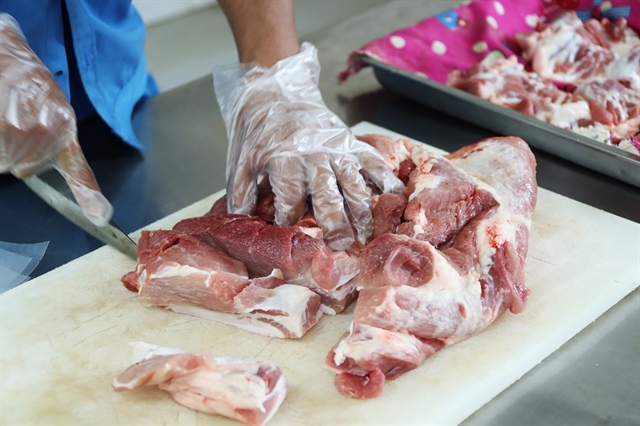
HÀ NỘI — Hà Nội's agriculture sector is focusing on the application of high technology to improve the capacity of processing agricultural produce, according to the Hà Nội Department of Agriculture and Rural Development.
Agricultural production has many risks because of dependence on weather and disease prevalence. The COVID-19 pandemic has particularly had a strong impact on the production - supply chain of the sector.
Accordingly, development of the processing industry is considered the optimal solution to improve the value of products and ensure the supply of farming produce for domestic consumption and export.
Besides that, the municipal agriculture sector will also focus on building raw material regions and forming closed production chains.
“In recent years, Hà Nội's agricultural product processing industry has made remarkable developments. Many businesses have invested tens to hundreds of billions of đồng to build processing plants, cold storage and warehouses preserving farm produce, contributing to improving the value of those products,” said Nguyễn Ngọc Sơn, deputy director of the Hà Nội Department of Agriculture and Rural Development.
According to General Director of Hương Sơn Food Joint Stock Company in Thanh Trì District Nguyễn Thị Thu Hương, processed farm products can keep for a longer time and economic efficiency of the products are two to three times higher than raw products.
Đào Thị Lương, director of the Tâm Anh Cooperative, specialising in the production and trading of organic vegetables and fruits in Phú Xuyên District, said: "Due to the impact of the COVID-19 pandemic, the cooperative has promoted investment in the processing stage and been cooperating with 30 cooperatives to produce food and vegetables.”
It has been also implementing a model of a 'mobile food market' to supply products to apartments and urban areas, Lương said.

Chairwoman of the Việt Nam Retailers Association Vũ Thị Hậu said: “Development of the processing industry is a mandatory choice in the context of the pandemic and for digital agriculture. Recently, most agricultural products traded on e-commerce platforms are processed products with quality, and brand names.”
“Hà Nội's agricultural processing enterprises now need regions of raw materials for processing, capital and technology to develop the agricultural produce processing industry,” said Đỗ Hoàng Thạch, director of the Việt Nam Agricultural Trade Promotion Joint Stock Company.
Chairman of the Thường Tín District People's Committee Kiều Xuân Huy said for enterprises investing in the processing stage, the district would have support relating to land and organise connections with cooperatives to create sustainable raw material supply.
Meanwhile, chairman of Thanh Oai District People's Committee Bùi Văn Sáng said the district would have financial support for agricultural produce processing enterprises in developing brands and trading the products on e-commerce platforms.
To improve the processing capacity of agricultural products for Hà Nội, Director of Hà Nội Department of Agriculture and Rural Development Chu Phú Mỹ said: “The city has policies on encouraging cooperatives and businesses to promote investment and application of high technology in developing the farm produce processing industry.”
"The department will also propose to restructure the agricultural sector in the direction of developing raw material regions. Enterprises will join the production - processing - consumption chain to increase the ability to supply raw materials for the processing facilities."
Hà Nội currently has 2,689 establishments producing and trading agricultural, forestry and fishery products, including about 400 processing facilities. The main produce of processing enterprises in Hà Nội are meat (42.6 per cent), seafood products (26.7 per cent), and vegetables and fruit (33.7 per cent). They have supplied about 1,000 tonnes of produce each month for the local market.
By 2025, Hà Nội expects that 50 per cent of farm produce processing facilities will use modern machinery, high technology and advanced quality management process.
By 2030, the capital city will build 15 agricultural produce processing facilities having links with value chains and competitive ability to meet the needs of the domestic and export markets.
It will also develop a processing, preservation and inspection complex for export products. — VNS
Xem thêm: lmth.yticapac-gnissecorp-ecudorp-mraf-sevorpmi-ion-ah/5757201/ymonoce/nv.swenmanteiv